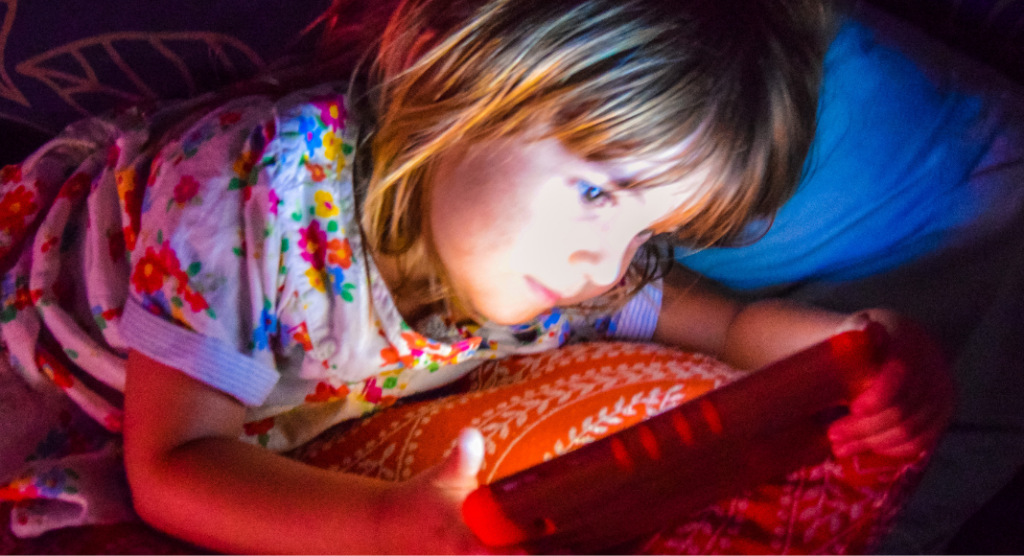
Screen time has become one of the most hotly debated topics in our culture. While we all try to be idealistic, I think most parents at this point aren’t deciding IF their child has screen time but HOW and WHEN.
This is a hard decision and personal to each individual family, but as a pediatrician, child psychiatrist, and a fellow mom, I have a few suggestions.
Most importantly, I encourage us all not to introduce screen time as a coping mechanism for our kids.
A coping mechanism is a strategy one uses in the face of stress to help manage painful or difficult emotions. Some coping mechanisms are helpful in the short term (for example, lying in bed all day helps me avoid the stress at school) but maladaptive long term (not attending school is worse for me in the long run).
We do not want our kids to learn that screens are a way to deal with difficult emotions in the moment, because it has harmful long term outcomes. Do not allow your child to use screen time if they are actively having a tantrum, melting down, feeling sad, angry, confused, or are attention-seeking. And try not to allow it as a coping mechanism for you, either. If you’re tired or having a bad day and your kid is annoying you (we’ve all been there!) that is not the best time to hand them a screen, to “give you a break.”
I know this sounds harsh, but let’s all step back for a minute and think about the implications this behavior has for our children.
Distraction Isn’t the Same as Coping
Let’s say your child is upset because you didn’t give him something he wanted—a cookie, a toy, his tablet— and he starts crying and screaming. This is not the time to give in and give him a screen to “cope” with his feelings. Because that’s not coping. That’s teaching the idea that when you’re upset, bury your head in this screen to avoid those feelings without dealing with the issue at hand. It also reinforces the tantrum. Our kid learns quite quickly that if she screams long enough, her parent will give her the tablet. And wow can kids be stubborn!
The reason I feel so strongly about this is because I am seeing how this plays out in teenagers when they are older and have unlimited, 24-hour access to their phones. The cell phone has become the single most frequently-used coping skill of all time. Feeling sad because your friend hurt your feelings? Go watch Youtube videos until you’ve forgotten about it. Are you angry at a teacher for a bad grade? Go play violent video games. Are you fighting with your parents and having a hard time expressing how you want to seek out your independence? Go post selfies on Instagram to make yourself feel better.
It’s Okay to Be Uncomfortable
What’s missing here is kids and teenagers having the opportunity to learn how to sit with uncomfortable feelings or moments, like frustration, anger, and sadness. I’ve written before on the importance of resilience, and I think screens interfere with resilience because they provide an easy out. I can ignore all the things I fear I can’t cope with by focusing on this screen.
This behavior starts when our kids are little. If we hand them the tablet when they are upset, we are teaching them a very dangerous lesson—if you don’t like the way you’re feeling right now, use this screen to avoid dealing with it.
Are You Dismissing a Kid in Need?
And moreover, as parents, if our kids are annoying us, that is NOT the time to give them the tablet. I know we are all doing the best we can, so take this with two grains of salt. But imagine if every time your spouse didn’t want to deal with you, he or she handed you your phone and said, Go play Candy Crush because I can’t handle you right now. It sends a very disheartening message to our children that they are “too much.”
So what to do about it then?
Introduce Structure
My best advice is to try to have some structure with your screen time. Consistency is key with almost all things parenting-related.
It’s OK to have screen time, just give it roughly at the same time every day so your child can know what to expect. This will help them learn boundaries that they can rely on when they are older and need to set limits with their own phones.
Work Through Feelings First
If your child is upset, crying or angry, sit with them to help them work through those feelings. Or give them some space to work through it on their own. Just DON’T give them the screen in that moment.
Have no doubt—this is HARD to do. It’s much easier for us to give them the tablet or phone or TV so that we don’t have to deal with their feelings or help them cope. But the easy solution in parenting is almost never the right one in the long run.
If your child is upset, empathize with them. Sit with them until the big feelings pass. Help them express their feelings through talking, writing, drawing, or playing. Go for a walk. Point out when they are calm again that even the most intense feelings come and go, and they can handle it. As you can tell, this takes a lot of time and effort. And your children’s emotional health is worth it.
Additional Resources
Want more suggestions on how to help your children cope with their big feelings? Check out these resources:
Susan David’s Ted Talk on Emotional Courage















